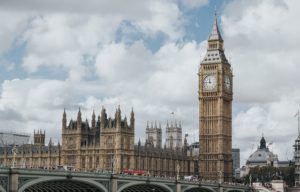A group of expat pensioners is charging the British government with discrimination over its policy of "freezing" the state pensions of some retirees living abroad, so that they do not receive the same inflationary rises others do.
The case will be the subject of a hearing on 2 September before the Grand Chamber of the European Court of Human Rights (ECHR).
The pensioners argue that the holding of their pensions at the rate at which they first started drawing them is discriminatory.
In November, a lower court of the ECHR rejected the applicants’ case in a 6-to-1 decision, but a referral subsequently was granted.
A website that identifies itself as representing the interests of ex-pat British pensioners whose pensions are frozen, Pension-Parity-UK, says that approximately half of all expatriate UK pensioners are affected.
A spokesman for the UK’s Department of Work and Pensions (DWP) said the decision whether or not to "uprate" UK pensions paid to expats has to do with "reciprocal agreements" Britain has with some other countries –including other EU members — but not with others.
In other words, UK pensioners living in France or Germany have their pensions increased in line with the increases enjoyed by pensioners back home in Britain because the French and German governments have agreed to boost the pensions of French or German retirees living in the UK, he said. However, pensioners who live in countries with which Britain does not have such reciprocal arrangements do not receive these upratings, he added.
Peter Kennan, chairman of the Canadian Alliance of British Pensioners, disputes the DWP argument, noting that some countries with which Britain does not have such agreements — such as Canada — nevertheless boost the pensions of their own nationals living in the UK. "It has nothing to do with reciprocal agreements, and everything to do with saving money," he added.
According to Alliance & Leicester International, the Isle of Man-based offshore savings bank which today (May 15) released a study on the subject of the freezing of expat pensions, seven of the 12 most popular overseas retirement destinations among British retires are on the frozen-pension list: New Zealand, South Africa, Dubai, Canada, Australia, Singapore and Hong Kong.
These pensioners “number 541,500 and live predominantly in British Commonwealth countries and British Overseas Territories”, the Pension-Parity-UK website says.
The 13 pensioners who have taken their case to the Court of Human Rights live in Canada, Australia and South Africa, and are supported in their cause by an organisation known as the International Consortium of British Pensioners (ICBP).
They argue that they are being discriminated against by the UK’s Department of Work and Pensions (DWP) for living in countries where UK retirees’ pensions are frozen – even though other British pensioners, living in such countries as the USA, Philipines and Israel, are awarded the same annual “up-ratings” enjoyed by those still resident in the UK.
The Pension-Parity-UK website quotes ICBP chairman Tony Bockman as saying the ECHR’s decision to re-examine the pensioners’ claim “is, in effect, a whole new hearing by a 17-judge court”.
“Half a million ‘frozen’ pensioners around the world are breathing more easily today, knowing that they may all yet see justice,” he added.
The Canadian Alliance of British Pensioners’ Kennan said the frozen pensions have hit particularly hard those Britons over the age of 65 who have gone to join their children abroad, unaware that in doing so "they would become a burden on their children" as their pensions failed to keep up with the rising cost of living.
"One of the 13 applicants, who had served in the Royal Navy, said all he was asking for was ‘to receive the same pension as the people he had served alongside and worked alongside’", Kennan added.
The case now before the ECHR, known as Carson and Others v the United Kingdom, comes after an unsuccuessful similar effort in the UK courts by one of the 13 applicants.
The case of Annette Carson, a British national who lives in South Africa, was ultimately dismissed on appeal before the House of Lords in May 2005.
The House of Lords judgement took into account the lower cost of living and the strength of the pound relative to the rand, as well as technical legal considerations, according to a source familiar with the case.
Had Carson’s pension been up-rated in line with inflation, like that of her UK fellow pensioners, it would now stand at £82.05 a week rather than £67.50, the rate at which it was frozen in 2000, the source noted.








